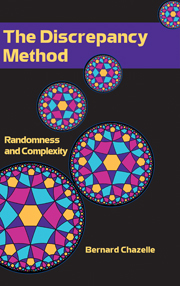Book contents
- Frontmatter
- Contents
- Preface
- 1 Combinatorial Discrepancy
- 2 Upper Bound Techniques
- 3 Lower Bound Techniques
- 4 Sampling
- 5 Geometric Searching
- 6 Complexity Lower Bounds
- 7 Convex Hulls and Voronoi Diagrams
- 8 Linear Programming and Extensions
- 9 Pseudorandomness
- 10 Communication Complexity
- 11 Minimum Spanning Trees
- A Probability Theory
- B Harmonic Analysis
- C Convex Geometry
- Bibliography
- Index
3 - Lower Bound Techniques
Published online by Cambridge University Press: 05 October 2013
- Frontmatter
- Contents
- Preface
- 1 Combinatorial Discrepancy
- 2 Upper Bound Techniques
- 3 Lower Bound Techniques
- 4 Sampling
- 5 Geometric Searching
- 6 Complexity Lower Bounds
- 7 Convex Hulls and Voronoi Diagrams
- 8 Linear Programming and Extensions
- 9 Pseudorandomness
- 10 Communication Complexity
- 11 Minimum Spanning Trees
- A Probability Theory
- B Harmonic Analysis
- C Convex Geometry
- Bibliography
- Index
Summary
Proving lower bounds on the discrepancy of geometric set systems often involves looking at the L2 norm of the discrepancy function. This makes sense given the wealth of techniques available for dealing with quadratic forms. A typical approach is to consider the incidence matrix A and bound the eigenvalues of ATA from below. Since the underlying set systems are often defined by “convolving” a shape with a set of points, one should expect Fourier transforms to be useful: After all, a characteristic feature of the Fourier transform is to diagonalize the convolution operator. Eigenvalue estimation can also be done by other methods, such as, in this case, wavelet transforms or finite differencing. We emphasize that the question is not to approximate eigenvalues numerically but to derive asymptotic bounds on them—a decidedly more difficult task.
This chapter samples the toolkit of available techniques: Haar wavelets, Riesz products, Fourier transforms and series, Bessel functions, Dirichlet and Fejér kernels, finite differencing, and so on. The emphasis of our discussion is on the methods rather than on the results themselves, so do not expect from this chapter a comprehensive coverage of the vast amount of knowledge on the subject. Instead, expect a wide assortment of powerful mathematical techniques for discrepancy lower bounds. In the spirit of the discrepancy method, it is important to master these techniques because of their importance in proving complexity bounds in later chapters.
- Type
- Chapter
- Information
- The Discrepancy MethodRandomness and Complexity, pp. 133 - 168Publisher: Cambridge University PressPrint publication year: 2000



